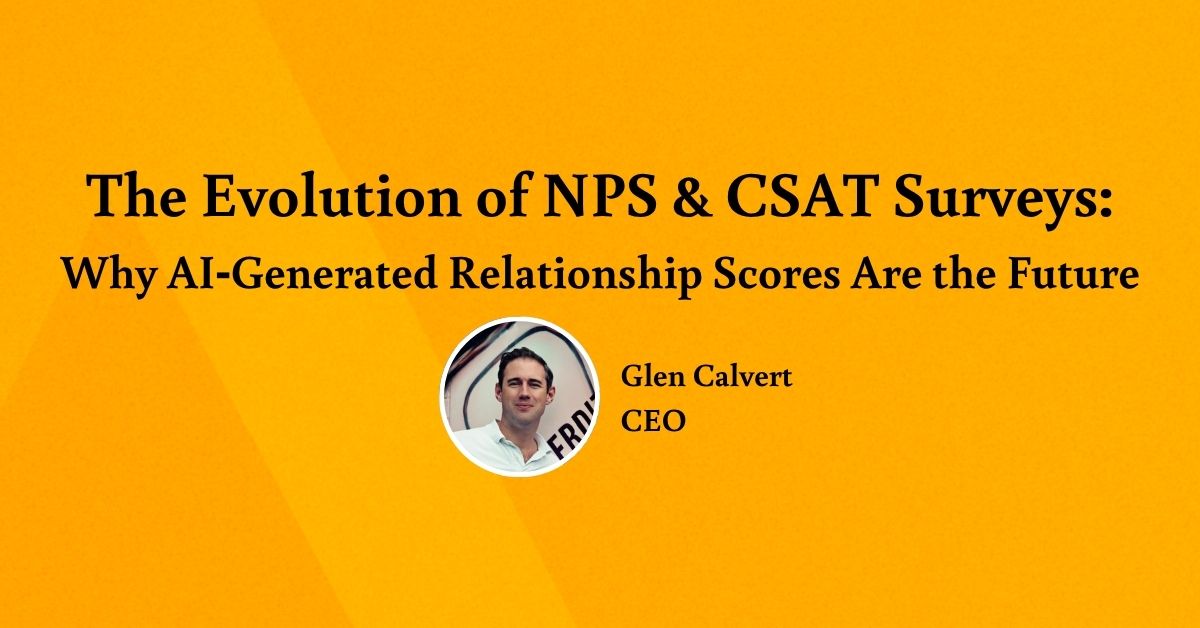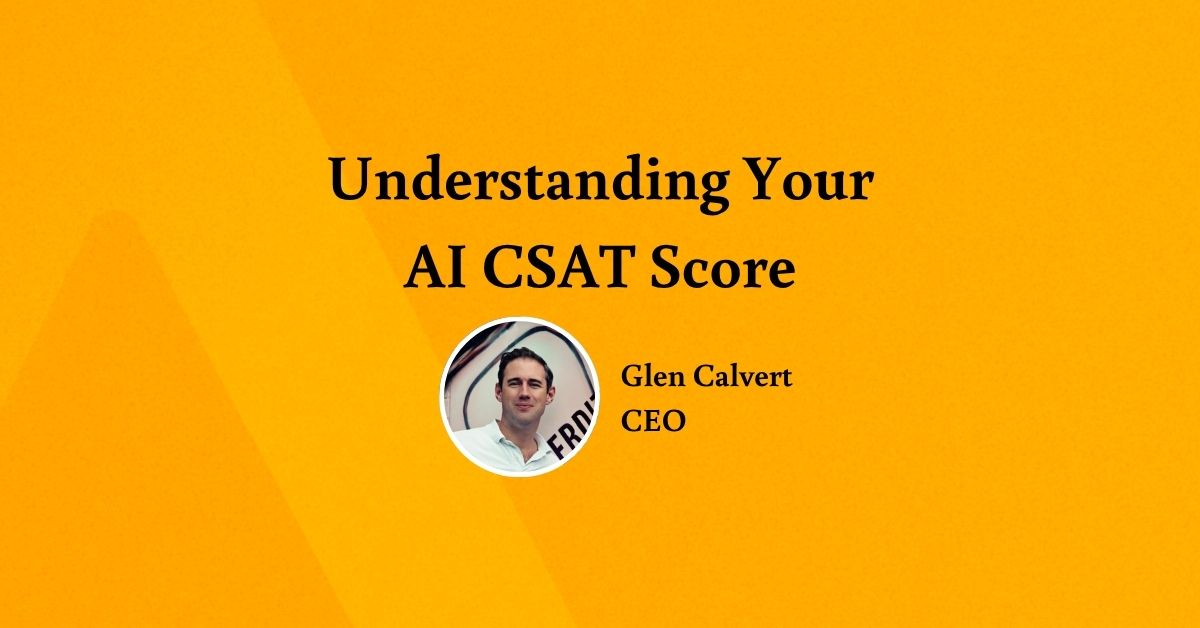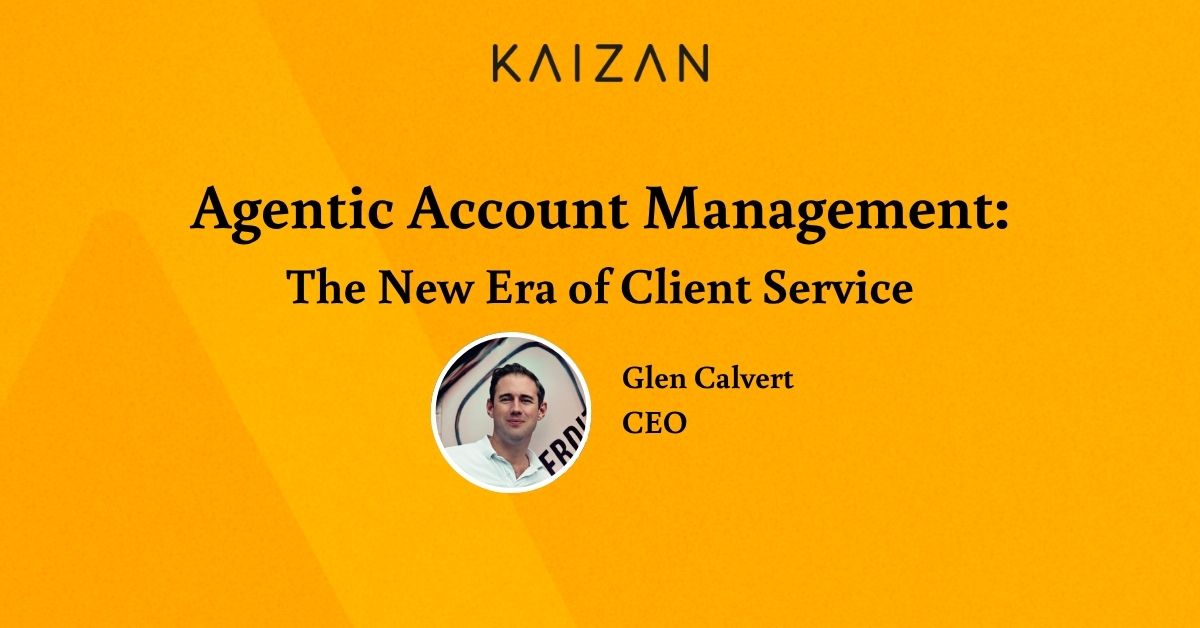Objective: AIP wanted to leverage GenAI to increase team efficiency, service levels and profitability
Results: All client SLAs are adhered to and average response time reduced across the board
Who are you and tell us about Anything Is Possible (AIP)?
I’m Mark, co-founder of AIP. We’re a media, creative and tech agency which has just turned six, launching the business in June 2018.
When we set up the business one of our founding principles was about connecting and automating. Specifically automating the mundane tasks that we’ve seen in our previous agencies and allowing our teams to focus on the high value, high cognition and strategic work. We created online reporting dashboards, which weren’t really used in previous agencies where you would share client reports in Excel. We’ve embraced AI most recently, especially over the last two years, as we’ve really grown our internal tech and development team. As co-founder, I’ve typically led our clients in the agency and provided an overall commercial role in the business.
Any concerns from clients regarding the use of AI?
Some clients have concerns around the tracking of their calls, but I think we’ve only got two clients that don’t allow AI to be present in those environments. Most clients are very receptive to it. If you explain the benefits really, clearly, and specifically that when our teams are on those calls, they’re not focused on making sure they write down notes and then sending follow-up contact reports. They’re focused on the client and asking the right types of questions with the comfort of knowing that all of the information is being picked up in the background.
From a leadership perspective, as the agency scales, it’s difficult to keep close to 30, 40, 50 clients. As a leader, it’s really useful to be able to go in, understand some of the key pain points of our clients or the themes of success to understand what we’re doing really well, and how we can apply that to other clients.
How have your staff found the rollout of AI and adoption of AI tools?
We believe that tech can evolve and enable much more effective media, creative and campaigns generally.
As part of our mission to improve the rollout and adoption of AI company-wide, Alex, our Head of Tech Solutions, surveyed the whole agency, to find out how they are using AI in their day-to-day jobs and how they see AI could improve some of the things that their specific team or their specific role could be doing in the business. This is all with the goal of helping resolve those pain points or the things that they’re spending a lot of time on, which aren’t adding value, we can use AI and automation to improve those and allow more time to focus on the high-value strategic work.
One of the early uses of AI for our teams was to go into client dashboards and review impressions, clicks, and conversion rates using AI because it’s quite simple. Once you’ve enabled it with all the data, it can pull out that commentary pretty easily and the teams can focus their time on insights and value.
What advice would you give to other agencies who are yet to adopt AI?
The agencies that don’t embrace AI will be left behind and those that do will succeed so my advice would be, don’t wait for anything to be perfect. AI for agencies is at MVP stage so it’s important to get people using it because the whole premise of AI is that it learns and develops the more you feel it with knowledge.
As a leader, what are the challenges you face scaling your agency operationally, and how does Kaizan assist with that process?
When we were starting out myself, Sam, our other co-founder were involved in everything, we had a view on every client and we were quite close to all of them. As we scaled, we started bringing in more people to help manage those clients and it became difficult to stay close and know what’s going on with clients. Now if we want to understand whats going on with a client we need to speak to the client lead, but we are also only understanding their perspective on what’s happening. Kaizan’s really helped the leadership team get a view of the sentiment and happiness of all our clients.
We do quite a lot of public tenders and many of our clients are in education or culture, both areas are highly procurement driven and service level orientated. Before introducing AI we wouldn’t know if we were meeting service levels, we might assume we were but now we’re able to get real time validation. Even if we survey our clients on a quarterly basis and go deep in a formal approach we can now overlay that with real time sentiment to understand client health, key challenges with the client or that they might be happy.
As we were involved quite early in the evolution of Kaizan, it’s been great to be part of that journey because we’ve seen it tailored to what we need. The things it can do now are so much better than when we started using the platform and it’s been embraced by our whole team.
What are your favourite Kaizan features?
The transcripts of meetings are great and frees up time, it’s also good for client leads because if you miss a meeting or you’re not directly involved in that client. Also, if you’re a leader and you’ve got three or four account managers that you need to provide you with updates on what’s going on with their clients, it’s useful to understand that sentiment. We use Kaizan to understand sentiment, and know that we’re engaging with the right stakeholders particularly if the decision-maker sentiment is high because they hold the keys to our long-term partnership. I love the return on investment on our time, we do a lot of work to measure profitability, but that doesn’t really pick up things like how often we communicate with clients or spend time with them on calls so the ROI on our time is super useful. It tells us that we are spending time on the right clients in the right areas.
Who are you and tell us about how you and your team use AI currently within the agency?
I’m Holly, I’m the Head of Client Partnerships at AIP and I oversee all the client relationships across commercial clients, culture hub and higher education. We have been using AI and AIP since the start and very operationally, it’s not just a buzzword but it’s in our processes like chatbots or automation. The main way that we talk about using AI is for lower value tasks which could be automated, to speed up our team so they have the time and the headspace to focus on more of the strategic value add for clients.
As the leader of a client-facing team, what do you hope to achieve when it comes to client management and delivery?
There are two things I want to achieve using AI across client partnerships. One is to identify those tasks that can be automated, where AI can be used to free up the team’s time for more strategic work. That way we can think about the client’s businesses holistically and where we could offer other AIP services to add more value and to hit the client’s goals. The other thing I want to achieve, similar to how we’ve started using Kaizan, is identifying sentiment and how we’re hitting SLAs across client partnerships which includes everything from response to briefs, response to emails and sentiment of calls. Along with our subjective view of those relationships, Kaizan gives us a useful data point to analyse how we’re partnering with clients and how happy clients are and satisfied.
What do you think of the future of AI and what it will enable and change in the client-service industry?
On an agency wide level, AI feels like a fast train that we have to get on or leave the platform because it’s going to make us raise our game and there’s going to be so many things that AI does that people don’t need to do anymore. We can’t sit back and be mediocre, we’re going to have to be looking at where we can add value to clients.
The work we do needs to be work which can’t be done by a chatbot. AI needs to free up our time to be strategic and creative. In order to do that, we’ll need to train more, be curious, and embrace the technology. If you put your head in the sand, you’re going to be left behind.
What are some of the pain points without a tool like Kaizan and what are some of the benefits of using it?
The main benefits the team and I have found with using Kaizan is it saves us time when it comes to lower value tasks. Things like transcribing meetings, or whether you’re on a call or not you’re able to quickly look at what the meeting summary was, the key action points, or any issues and quickly identify them without having to either be on that call or go through all the details. It’s also really helpful using Kaizen as another data point.
For example when looking at which clients were on a call, finding out whether it was your decision makers, and the sentiment of the call overall as well as client response times. This filters down into whether they want time with you or not, or if they want their lives to be made easier and for you to help support their business objectives.
Are there areas you think that clients will start to demand how an agency operates and provides its services?
The more that agencies can use AI and similar automation tools in the background without causing too much effort or change, the better. When clients do hear from people in their team it should be about the future, focus areas, where support is needed and less task orientated. Changing the focus on business orientation in those client conversations to what needs to happen, bringing clients news, innovation and tailored recommendations.
Who are you and tell us about your role?
I’m Chloe, I’m a Client Partnerships Manager at AIP which makes me responsible for managing clients, developing strong relationships, and being an day to day point of contact for making sure that all key deliverables and client objectives are met.
What effects has AI had on your work in the past couple of years?
AI has had a big effect in helping me from an efficiency standpoint. It analyses bits of data for me and helps me with client performance reports, but also if there’s ever a problem I can go to an AI chatbot and ask for its thoughts on the solution or to help me with wording. It’s having a huge effect and particularly Kaizan which transcribes and records all my calls which has been really helpful for me because it takes a pressure off me to constantly be actively making notes and actions. Instead I can go and refer to the transcript after a call, and other team members also don’t have to be on the calls, I can just send them through the transcript. Kaizan will write me a follow-up email and make sure that all my actions are recorded.
As a client partnerships manager, what changes do you think are coming to the role, and which do you think will benefit you?
AI is having a big impact on my work at the moment in terms of responding to clients and making sure that I’m wording things in the most impactful way, helping me with the meeting notes and any action items. It allows me to basically free up my time to focus on higher value strategic tasks, including more face-to-face time with clients. It frees up my time to allow for more high-value tasks.



